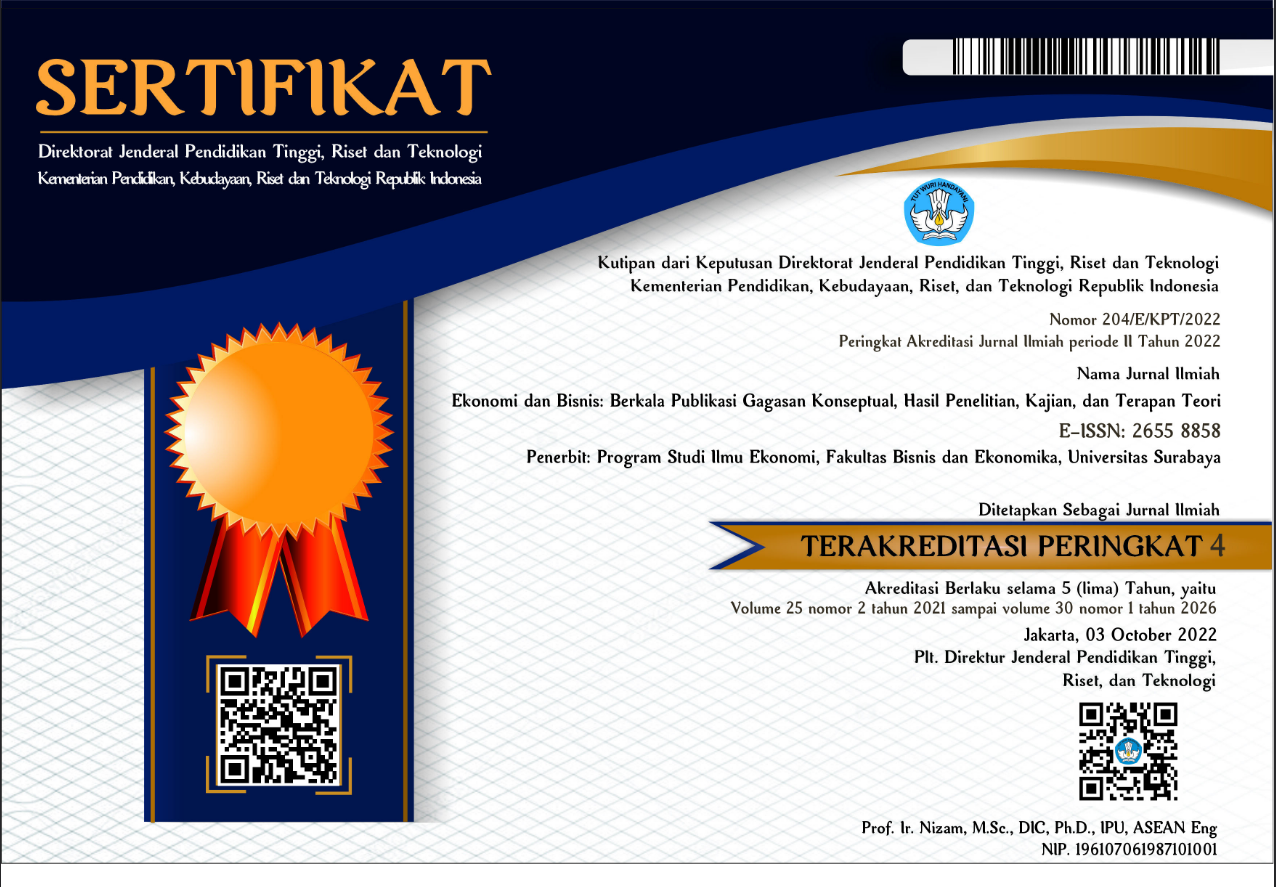ANALISIS DETERMINAN KUALITAS LINGKUNGAN PERIODE 1999-2013
 Abstract Views:
376 times
Abstract Views:
376 times
 PDF Downloads:
326 times
PDF Downloads:
326 times
Abstract
The purpose of this study is to analyze the impact of Foreign Direct Investment, Gross Domestic Product, Energy Consumption, Electric Consumption, and Meat Consumption on CO2 emissions of 41 countries in the world using panel data from 1999 to 2013. After analyzing 41 countries in the world data, furthermore 17 countries in Asia was analyzed with the same period. This study utilized quantitative approach with Ordinary Least Square (OLS) regression method. The results of 41 countries in the world data indicates that Foreign Direct Investment, Gross Domestic Product, Energy Consumption, and Meat Consumption significantlyaffect Environmental Qualities which measured by CO2 emissions. Whilst the results of 17 countries in Asia data implies that Foreign Direct Investment, Energy Consumption, and Electric Consumption significantlyaffect Environmental Qualities. However, Gross Domestic Product and Meat Consumption does not affect Environmental Qualities.
Downloads
References
International Energy Agency. (2013). World Energy Outlook. IEA.
Jiang, Yanqing. (2015). Foreign direct investment, pollution, and the environmental quality: a model with empirical evidence from chinese regions. International Trade J, .
Kivyiro., Pendo., Arminen. (2015). Carbon dioxide emissions, energy consumption, economic growth, and foreign direct investment: causality analysis for sub-saharan Africa. Energy 74 (1), 595-606.
Linh and Lin. (2012). CO2 emissions, energy consumption, economic growth, and FDI in Vietnam. Manag. Global Transitions 12 (3), 219-232.
Ministry of Energy and Mineral Resources Republic of Indonesia. (2015). Handbook of Energy and Economic Statistics of Indonesia. Ministry of Energy and Mineral Resources Republic of Indonesia.
Omri, Anis., Nguyen, Duc Khuong., Rault, Christophe. (2014). Causal interactions between CO2 emissions, FDI, and economic growth: evidence from dinamic simultaneous equation models. Economic model (42), 382-389.
Pao and Tsai. (2011). Multivariate Granger causality between CO2 emissions, energy consumption, FDI, and GDP: Evidence from a panel of a BRIC countries. Energy (36), 685-693.
Pasal 1 ayat (1) UU No. 25 Tahun 2007. (2007). Undang Undang Dasar 1945. Pemerintah Republik Indonesia.
Peter and Jeffrey (2003). Exporting the greenhouse: foreign capital penetration and CO2 emissions 1980-1996. Journal of World-Systems Research, 2, 261-275.
Petrovic, Zoran., Djordjevic, Vesna., Milicevic, Dragan., Nastasijevic, Ivan., Parunovic, Nenad. (2015). Meat production and consumption: Environmental consequences. Procedia Food Science (5), 235 – 238
Shahbaz, Muhammad., Nasreen, Samia., Abbas, Faisal., Anis, Omri. (2015). Does foreign direct investment impede environmental quality in high-, middle-, and low-income countries? Energy Economics, 275-287.
Statistik transportasi darat. (2014). Publikasi statistik transportasi darat. Badan Pusat Statistik Indonesia.
Tamazian and Rao. (2010). Do economic, financial,and institutional developments matter for environmental degradation? Evidence from transitional economies. Energy Economics 32 , 137-145.
Tang and Tan. (2015). The impact of energy consumption, income and foreign direct investment on carbon dioxide emissions in Vietnam. Energy 79 (1), 447-454.
Undang-undang No 23 pada tahun 1997 Tentang Pengelolaan Lingkungan Hidup. (1997). Undang Undang Dasar 1945. Pemerintah Republik Indonesia.
Wulandari, Mira Tri., Hermawan, Purwanto. (2013). Kajian Emisi Co2 Berdasarkan Penggunaan Energi Rumah Tangga Sebagai Penyebab Pemanasan Global. Disertasi: Universitas Diponegoro, Semarang, Indonesia.
Zhang, Chuanguo and Zhou, Xiangxue. (2016). Does foreign direct investment lead to lower CO2 emissions? Evidence from a regional analysis in China. Renewable and Sustainable Energy Reviews 58 , 943-951.
Zikmund, William. (2003). Business Research Methods, Seventh Edition. United States of America: Thomson Learning.

 DOI:
DOI:















